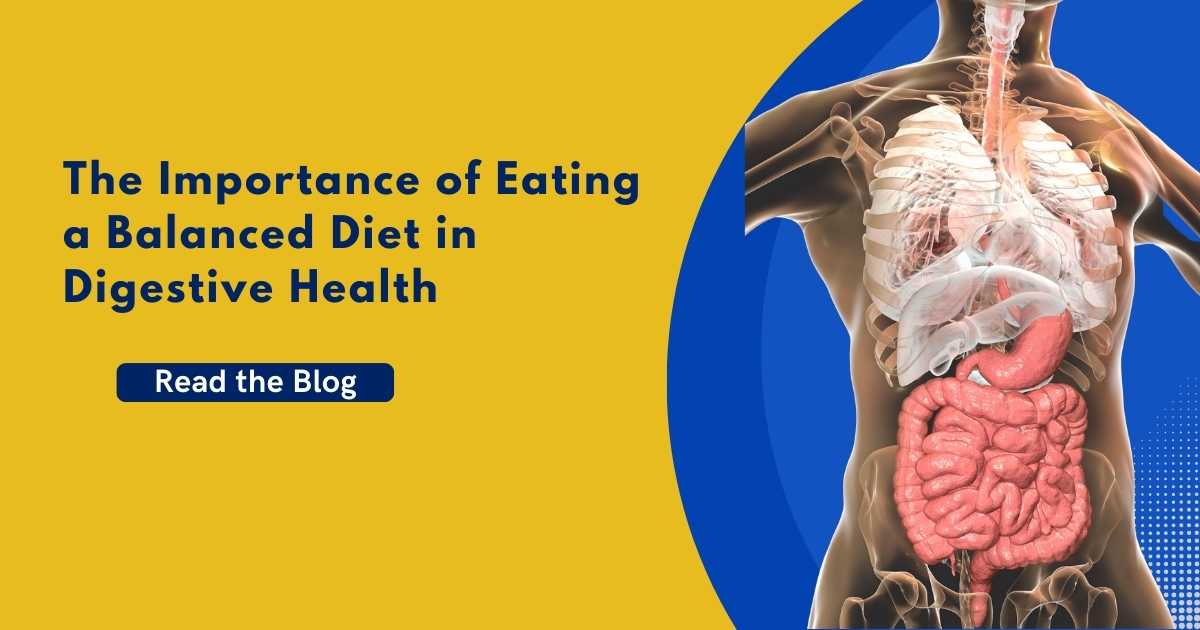The Importance of Eating a Balanced Diet in Digestive Health
Digestive health is central to our general well-being, and what we eat is critical to keeping a healthy digestive system. In this article, we will look at the importance of eating a well-balanced diet and how it affects digestive health.
The Foundation: Understanding a Balanced Diet
Consuming a variety of foods that deliver important nutrients in the proper proportions to our body constitutes a balanced diet. This consists of a variety of fruits and vegetables, nutritious grains, lean proteins, and healthy fats.
The Digestive System: A Complex Network
Before digging into the significance of a well-balanced diet, it’s critical to understand the complexities of our digestive system. This complex network of organs, enzymes, and bacteria works together to convert the food we eat into nutrients that our systems can absorb.
The Role of Fiber in Digestive Health
1.Maintaining Regular Bowel Movements
– Fiber adds bulk to stool which prevents constipation and promotes regular bowel movements.
2.Supporting Gut Microbiota
– Soluble fibers nourish beneficial gut bacteria, fostering a healthy balance in the microbiome.
Proteins and Digestive Enzymes: Partners in Digestion
1.Enzyme Production
– Proteins help to produce digestive enzymes, which break down food into smaller, more absorbable components.
2.Tissue Repair and Maintenance
– Proteins are essential for the repair and maintenance of digestive tract tissues.
The Role of Healthy Fats
1.Absorption of Fat-Soluble Vitamins:
– Healthy fats aid in the absorption of fat-soluble vitamins like Vitamn A, D, E and K. These vitamins are crucial for our overall health.
2.Anti-Inflammatory Effects
– Omega-3 fatty acids found in sources like fish have anti-inflammatory properties. This can directly benefit the digestive tract.
Balancing Macronutrients is the Key to Stable Blood Sugar
1.Preventing Blood Sugar Spikes
– A healthy diet helps to maintain optimal blood sugar levels. This helps in preventing surges that can cause stomach problems..
2.Energy for Digestive Processes
– Digestion is an energy-intensive process. Balanced macronutrients provide a sustained energy source for the digestion process.
Hydration: A Fundamental Aspect
1.Facilitating Digestion
– Water aids in the digestion and absorption of nutrients, ensuring a smooth flow of food that is getting digested through the digestive tract.
2.Preventing Constipation
– A well-hydrated body helps prevent constipation. This problem of constipation is a common digestive issue.
The Impact of Processed Foods on Digestive Health
1.Low in Fiber
– Processed foods are more often low in fiber. Such foods can contribute to constipation.
2.Disrupting Gut Microbiota
– Excessive consumption of processed foods can negatively impact the balance of gut bacteria.
As a matter of fact, the value of a well-balanced diet in sustaining good digestive health cannot be emphasized. From promoting regular bowel movements to promoting a healthy gut flora to delivering important nutrients for digestive processes, the foods we eat have a significant impact on the health of our digestive system. Individuals can promote digestive health and improve their overall quality of life by prioritizing a diversified, nutrient-rich diet and limiting their intake of processed foods.

